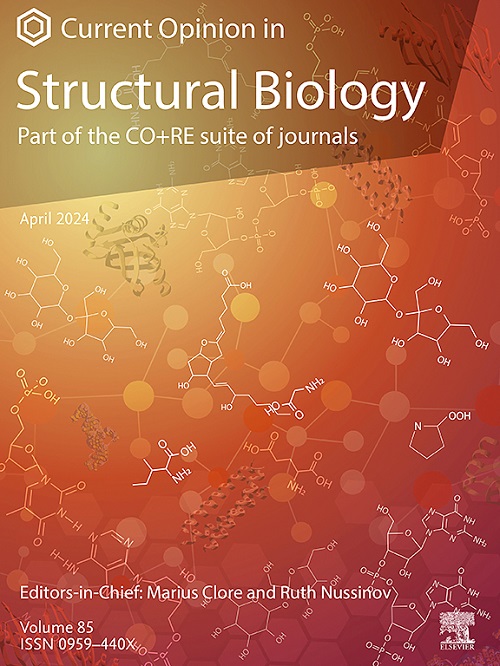内在无序蛋白质的深度学习:从改进预测到解密构象组合。
IF 6.1
2区 生物学
Q1 BIOCHEMISTRY & MOLECULAR BIOLOGY
引用次数: 0
摘要
本质无序蛋白(IDPs)在生理条件下缺乏稳定的三维结构,这对传统的基于结构的预测方法提出了挑战。本综述探讨了现代深度学习方法对蛋白质无序预测的影响,这些方法已经彻底改变了球蛋白的结构预测。我们强调了由社区推动的数据整理和最新技术评估工作的作用,这对推动该领域的发展至关重要。我们还回顾了利用深度学习技术的最新方法,重点介绍了创新方法。我们还探讨了利用新型机器学习方法直接从序列数据中鉴定蛋白质构象组合的进展。本文章由计算机程序翻译,如有差异,请以英文原文为准。
Deep learning for intrinsically disordered proteins: From improved predictions to deciphering conformational ensembles
Intrinsically disordered proteins (IDPs) lack a stable three-dimensional structure under physiological conditions, challenging traditional structure-based prediction methods. This review explores how modern deep learning approaches, which have revolutionized structure prediction for globular proteins, have impacted protein disorder predictions. We highlight the role of community-driven efforts in curating data and assessing state-of-the-art, which have been crucial in advancing the field. We also review state-of-the-art methods utilizing deep learning techniques, highlighting innovative approaches. We also address advancements in characterizing protein conformational ensembles directly from sequence data using novel machine learning methods.
求助全文
通过发布文献求助,成功后即可免费获取论文全文。
去求助
来源期刊

Current opinion in structural biology
生物-生化与分子生物学
CiteScore
12.20
自引率
2.90%
发文量
179
审稿时长
6-12 weeks
期刊介绍:
Current Opinion in Structural Biology (COSB) aims to stimulate scientifically grounded, interdisciplinary, multi-scale debate and exchange of ideas. It contains polished, concise and timely reviews and opinions, with particular emphasis on those articles published in the past two years. In addition to describing recent trends, the authors are encouraged to give their subjective opinion of the topics discussed.
In COSB, we help the reader by providing in a systematic manner:
1. The views of experts on current advances in their field in a clear and readable form.
2. Evaluations of the most interesting papers, annotated by experts, from the great wealth of original publications.
[...]
The subject of Structural Biology is divided into twelve themed sections, each of which is reviewed once a year. Each issue contains two sections, and the amount of space devoted to each section is related to its importance.
-Folding and Binding-
Nucleic acids and their protein complexes-
Macromolecular Machines-
Theory and Simulation-
Sequences and Topology-
New constructs and expression of proteins-
Membranes-
Engineering and Design-
Carbohydrate-protein interactions and glycosylation-
Biophysical and molecular biological methods-
Multi-protein assemblies in signalling-
Catalysis and Regulation
 求助内容:
求助内容: 应助结果提醒方式:
应助结果提醒方式:


